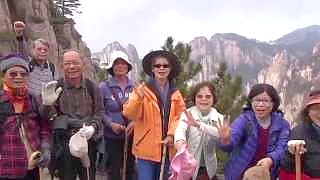With FunFancie ...
[640],shadow=true,start=405,stop=WangXianGu, also known as The Fairy Valley or Valley of the Immortals, is a legendary place in Chinese mythology and Taoist folklore. It holds significance in Chinese culture as a symbol of spiritual attainment, immortality, and the pursuit of enlightenment.
According to legend, WangXianGu is located in the remote and mystical mountains of China, often described as being hidden within the mist-shrouded peaks of the Kunlun Mountains or other ranges. The name "WangXianGu" translates to "Valley of Seeking Immortals" or "Valley of Longing for Immortals," reflecting its association with those who seek to attain immortality through spiritual cultivation and the practice of Taoism.
In Chinese mythology and Taoist beliefs, immortals are revered beings who have achieved enlightenment, transcending the mortal realm to become eternal and divine. It is said that WangXianGu is inhabited by these immortal beings, who reside in secluded caves, pavilions, or palaces within the valley's lush and picturesque landscape.
Throughout history, WangXianGu has been a source of inspiration for poets, scholars, and artists, who have depicted it in literature, paintings, and other forms of art. It has also become a symbol of the quest for inner harmony, wisdom, and spiritual liberation in Chinese culture.
While WangXianGu is primarily a mythological and metaphorical concept, there are real locations in China that are sometimes associated with the legend, such as scenic valleys, mountain retreats, and sacred sites believed to be imbued with spiritual energy. These places often attract pilgrims, seekers, and tourists seeking to experience the tranquility and beauty that are reminiscent of the mythical Fairy Valley.
 WangXianGu The Fairy Valley 望仙谷
WangXianGu The Fairy Valley 望仙谷





![A great film of the Great Wall north of Beijing, including `wild wall`, accompanied by great music (踏古 (Ta Gu) by Lin Hai, `Walking into Ancientry`, with Chinese lute (pipa)). We [mum, dad - videographer - and son and daughter, from Singapore] hiked 3 sections of the Great Wall in winter, without any guides after studying blogs and posts by fellow hikers. All these sections are different. From the unrestored GuBeiKou Great Wall where we were the only people around, to the wonderful JinShanLing, where the climb is steep and every direction gives you good photo opportunities, to the restored MuTianYu where we hiked in heavy snowfall. We stayed at local farmhouses on both nights, dined with the locals and hitched rides to nearby bath-houses. Temperature ranged from -5 deg C (day) to -12 deg C (night). Winter daybreak is at 7am and the sky becomes dark by 5pm so one has only 10 hours of daylight, so plan your travelling and hiking schedules carefully. This once-in-a-lifetime experience was captured on video and we would like to share it with you. The feelings just can`t be described - you need to experience it first hand. Take only memories, leave only footprints and kindness ... A wonderful animation combining traditional Chinese painting and dance - don`t miss it ! 踏古-林海 作曲:林海 视频作者:中国传媒大学动画学院 Hiking the Great Wall 长城 of China in the snow](https://www.beijingbuzzz.com/b183.jpg)






